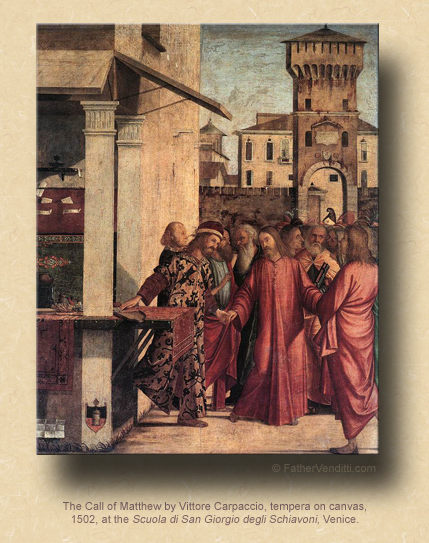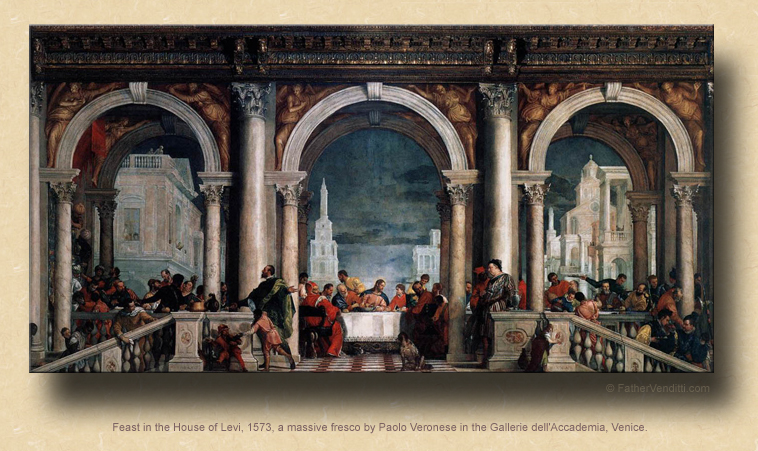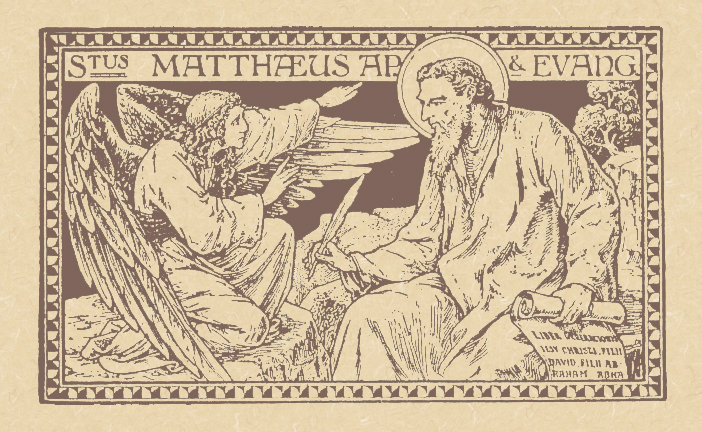Conversion Never Ends.
The First Saturday of Ordinary Time; or, the Saturday Memorial of the Blessed Virgin Mary.
Lessons from the primary feria, according to the ordinary form of the Roman Rite:
• I Samuel 9: 1-4, 17-19; 10: 1.
• Psalm 21: 2-7.
• Mark 2: 13-17.
|
When a Mass for the memorial is taken, lessons from the feria as above, or any lessons from the common of the Blessed Virgin Mary.
|
The Fourth Class Feria of the Blessed Virgin Mary on Saturday; and, the Commemoration of Saint Prisca, Virgin & Martyr.*
Lessons from the common "Vultum tuum…" of the Blessed Virgin, according to the extraordinary form of the Roman Rite:
• Titus 3: 4-7.
• Psalm 44: 3, 2.
• Luke 2: 15-20.
FatherVenditti.com
|
 12:39 PM 1/18/2020 — Today's Gospel lesson introduces us to Levi—later called Matthew—and how he quickly responded to our Lord's call. There are a few of these episodes in the Holy Gospel in which our Blessed Lord is gathering around Himself His first disciples: He comes upon people of whom we've not read before, calls them to follow Him, and, without saying a word, they get up and go. 12:39 PM 1/18/2020 — Today's Gospel lesson introduces us to Levi—later called Matthew—and how he quickly responded to our Lord's call. There are a few of these episodes in the Holy Gospel in which our Blessed Lord is gathering around Himself His first disciples: He comes upon people of whom we've not read before, calls them to follow Him, and, without saying a word, they get up and go.
If we compare the call of Levi to the call of Simon and Andrew, we notice that, in both instances, these men are busy at their jobs when our Lord approaches them; the one difference is that, in the case of the two brothers, the job at which they work is rather innocuous;—there are no moral or political implications to being a fisherman—but, in the case of Levi, his position as a customs official and tax collector adds a new dimension to his call: he's a hated man. We can relate to this: some Scripture translations call these men “publicans,” that is, public officials; they were hated because, just like they do today, they lived rather high off the hog, profiting from their offices by means of the taxes they collected from their fellow Jews on behalf of the Romans. In fact, in the minds of many Palestinian Jews, they were traitors, since they were working for the enemy. That's why the Pharisees were so scandalized by our Lord wanting to call Levi. Levi, of course, responds very generously to our Lord's call, and shows his gratitude by inviting our Lord to dinner.
The reason for his joy at being called by our Lord, and his immediate response, we may never know, but I tend to think that, like most people who spend their lives scampering after worldly profits, he's found that everything he's accumulated has left him empty inside. Nevertheless, we must be cautious about thinking that Levi completely changed his life then and there: Levi’s conversion begins this day our Lord called him, but he clearly still has a long way to go.

Those of us who were born into the faith may never have had a major conversion experience; but, those who have, if they are being truly honest about it, would have to admit that the day they had that experience was only a first step. It’s after that that the struggle begins. Conversion, after all, is a life-long process: it may have a well-defined beginning, like it did for Levi in today’s Gospel lesson, but it never has an end for any us.
When our Lord calls him, Levi is not a perfect person, but our Lord is willing to take Levi where he's at. He's not willing to leave Levi where he's at, as we know; but, at least for now He takes him as he is, and this is what the Pharisees and Scribes didn't quite understand. Our Lord's response to them is as familiar as any verse in Sacred Scripture: “It is not those who are in health that have need of the physician, it is those who are sick” (Matt. 9: 12 Knox). Consoling words, to be sure, but which must be understood within the context of the full import of those words: what good is a doctor who commiserates with you over the fact that you’re not feeling well, but then does nothing to effect a cure? And, more often than not, the cure requires us to do inconvenient things we were not doing before. Some of you know that I was the victim of a gun shot to my left hand back in October. Each week I must go for phystical therapy, and submit to a lot of painful treatments which continue to this day; but, I know I have to do it, or else I'll never recover use of that hand.
But we are not only consoled by our Lord's words as they apply to ourselves, but how they inspire us to regard those around us with increased charity. Those we meet along the way may not be where they should be—or where we think they should be—on their own journey toward Christ; but, assuming that we're not fooling ourselves regarding our own conversion:—which is always a possibility—if our Lord is willing to take them as they are, at least initially, than so should we. After all, one does not inspire conversion in others by berating and lecturing them, but by befriending them and encouraging in them a desire to change. If Jesus had looked at Levi collecting his taxes and said, “I'm not interested in him; he's not what a want,” then the Church would have been deprived of a great Apostle and an entire Gospel.
So, today let us not only commit ourselves to our own ongoing conversion, but let us also appeal to our Blessed Lord to help us encourage conversion in others by an increase in the practice of the virtue of charity.

* Prisca, a Roman, suffered martyrdom at the age of thirteen under the Emperor Claudius in the first century.
This day was fomerly the Feast of St. Peter's Chair in Rome. That feast has since been merged with the Feast of St. Peter's Chair in Antioch, Feb. 22nd; but, Jan. 18 is still used to open the Octave of Prayer known as the Chair of Unity Octave. The Missal of St. John XXIII provides a Votive Mass of St. Peter's Chair which may be used on this day. Thus, no Mass is made available for the commoration of St. Prisca.
|

